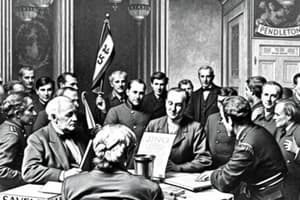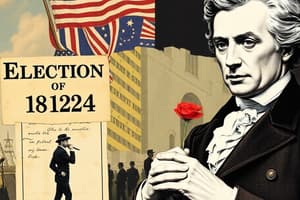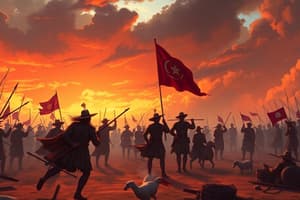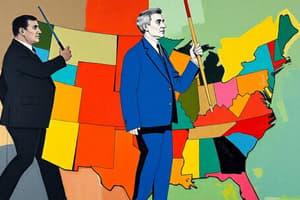Podcast
Questions and Answers
What was the spoils system?
What was the spoils system?
The spoils system was used for giving government jobs to loyal followers and aimed to remove officials who might not align with the new administration.
What name was given to Jackson's informal group of advisers?
What name was given to Jackson's informal group of advisers?
Kitchen Cabinet
What was the view of many Whites toward Indians?
What was the view of many Whites toward Indians?
They did not see the Indians as real people and believed they should be civilized and leave their land.
How did Indians typically view Whites?
How did Indians typically view Whites?
What Indian leader lost most of his followers at the Bad Axe Massacre?
What Indian leader lost most of his followers at the Bad Axe Massacre?
What is the Hermitage?
What is the Hermitage?
What is meant by Kitchen Cabinet?
What is meant by Kitchen Cabinet?
What are the two basic types of tariffs?
What are the two basic types of tariffs?
What area of the country received the most benefit from the tariffs and why?
What area of the country received the most benefit from the tariffs and why?
Who became the South's spokesman and leading defender of states' rights?
Who became the South's spokesman and leading defender of states' rights?
What senator attacked nullification and what did he fear would happen to the Union if it were enacted?
What senator attacked nullification and what did he fear would happen to the Union if it were enacted?
Flashcards are hidden until you start studying
Study Notes
Spoils System
- A political practice where government jobs were awarded to loyal supporters of the winning party.
- Aimed to remove previous officials who were unsupportive of new administration policies.
- Increased political power for the party in control; however, it resulted in inefficiency and potential corruption.
- Contributed to the rise of political machines, which sought to dominate local government.
Kitchen Cabinet
- Informal group of close friends and advisers to President Andrew Jackson.
- Served as important sources of advice and discussion for Jackson's policies and ideas.
White Perspectives on Native Americans
- Many whites did not recognize Native Americans as individuals or equal beings.
- Believed that Indians should adopt white culture and relinquish their lands.
- Justified encroachment on Indian territories due to treaties viewed as legitimate purchases.
Native American View of Whites
- Native Americans perceived many whites as greedy and exploitative, desiring land and resources.
- Lacked understanding of private land ownership and the implications of treaty agreements.
- Hostility resulted from historical mistreatment and deception experienced at the hands of white settlers.
Black Hawk and the Bad Axe Massacre
- Black Hawk, a leader of the Sauk and Fox tribes, lost many followers during this tragic event.
- After being forced from their land due to treaty enforcement, he attempted to return for sustenance in 1832.
- Misinterpreted as an act of war, leading to military confrontation and significant losses for his band.
Hermitage
- The name of Andrew Jackson's plantation and mansion, significant to his personal history.
Kitchen Cabinet (Reiteration)
- Group consisting of Jackson's advisers who provided opinions and strategies in governance.
Types of Tariffs
- Revenue Tariff: Aimed to generate income for the federal government through taxation on imports. Encouraged local manufacturers to innovate and lower prices to remain competitive.
- Protective Tariff: Designed to shield American businesses from foreign competition, leading to complacency among domestic producers and less revenue for the federal treasury.
Geographic Impact of Tariffs
- New England and Mid-Atlantic regions, particularly New York and Pennsylvania, reaped benefits from protective tariffs due to their manufacturing industries.
- Revenue tariffs bolstered local economies by increasing funds available to businesses.
Advocacy for States' Rights
- John C. Calhoun emerged as a primary advocate for states' rights in the South, with Robert Hayne also supporting this stance.
Daniel Webster's Opposition to Nullification
- Senator Daniel Webster argued against nullification, emphasizing federal supremacy over state power.
- Warned that nullification threatened the unity of the nation and urged dissenters to seek constitutional resolutions through the Supreme Court instead.
Studying That Suits You
Use AI to generate personalized quizzes and flashcards to suit your learning preferences.




